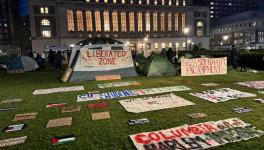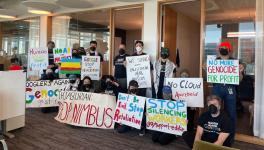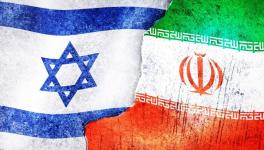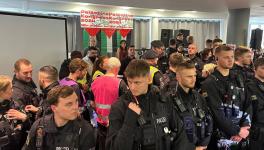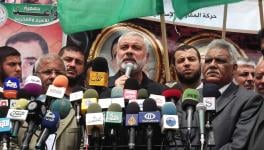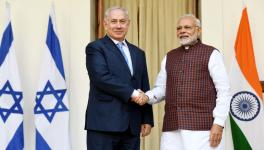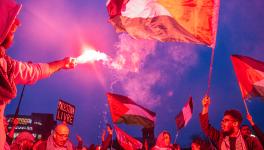Of Ceasefires and Their Violation
About a month back, on 7th July, Israel launched a military operation in the Gaza strip to supposedly counter Palestinian rocket firing by Hamas. The operation was called “Protective Edge”. What began as an airstrike attack, expanded into a full-fledged ground operation by 17th July. Since then, there have been a series of attempted temporary ceasefires and their violation. The 72 hour ceasefire announced by US Secretary of State, John Kerry, which began at 05:00 GMT today and its subsequent violation around 07:00 GMT, is the latest in the series. As always, Israel has accused Hamas of violating truce. News reports of the last few days and OCHA’s (United Nations Office for the Coordination of Humanitarian Affairs) report for 29th-30th July, however, are telling a different story.
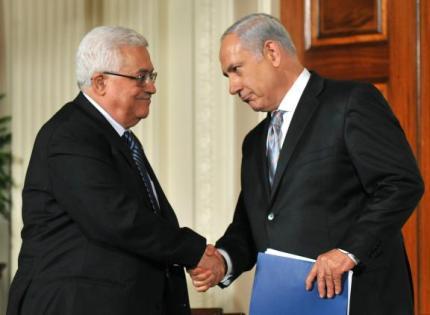
Photo courtesy: Mondoweiss
29th- 30th July
According to the OCHA report of this period, “a four hour humanitarian ceasefire was declared by the Israeli military but rejected by Hamas.” Now before blaming Hamas for rejecting this offer (which, let’s face it, is just enough time for the Israelis to reboot, reequip and retaliate even more strongly) perhaps the reason for the same should be looked into. The offer was “rejected by Hamas on the grounds that it did not extend to the entire Gaza strip and the pause was characterized by continuing hostilities, including the shelling of Ash Shuja’iyah market.” Not so unfair now, is it? Let’s look at the scale of these “continuing hostilities”.
The Jabalia Elementary Girls’ School, where 3300 IDPs (internally displaced persons) were taking refuge, was struck by Israeli shells “a minimum of three times”. It killed 15 people, of which 4 were children. Of particular consequence is the statement by Leila Zerrougui, Special Representative of the Secretary-General for Children and Armed Conflict, in which she says- “After three weeks of conflict, no one can doubt that there are no safe places for the children of Gaza. Today, another school, used to shelter 3300 displaced people was hit by Israeli shelling, despite clear information provided to the Israeli army from the UN that the school was housing IDPs.” For those doubting the clarity of information, the Israeli army was informed 17 times, “the last being just hours before the final shelling!” Gaza’s sole power plant (GPP) was also shelled by Israeli forces, further deepening the power crisis in the region and directly affecting the public health service situation. As per the UN report, Gaza now survives on just 2 hours of electricity per day, that too limited to certain areas. The Ash Shuja’iyah market shelling- which resulted in Hamas’ rejection of temporary ceasefire- killed 17 people and left hundreds injured.
The overall statistics published by the report are shocking to say the least. 1263 Palestinians have been killed till now which consist of 852 civilians (68%), 249 children and 135 women. According to Gaza emergency services’ figures, the number of deaths is as high as 1435, with about 8100 wounded. In sharp contrast, 59 Israelis have been killed till now out of which 56 were soldiers and 3 were civilians including one foreign national. This should put to rest, once and for all, the talk about Israel not targeting civilians. Among those attacked by Israel were 68 families who lost three or more family members, bringing the total to 360 fatalities. In addition to this, a staggering 245,000 Palestinians have also been displaced.
30th- 31st July
While the UN Security Council called for a temporary ceasefire in Gaza, “Israel vowed to continue its military offensive” and destroy a network of terror tunnels. In a meeting in Tel Aviv, Israeli Prime Minister, Benjamin Netanyahu said. "Until now, we have destroyed dozens of terror tunnels and we are determined to finish this mission -- with or without a ceasefire. So I will not accept any (truce) proposal that does not allow the (military) to complete this work for the security of Israel's citizens." This remark is all the more significant in the backdrop of statements made by the US and the Israeli army. The former decided to continue supplying ammunitions to Israel while the latter confirmed the addition of 16,000 reserve soldiers bringing the total to 86,000.
Israel also denied it had any role in the Jabaliya School attack, blaming it conveniently on a misfired Hamas rocket, despite all the evidence pointing to the contrary. General Moti Almoz, spokesperson of the Israeli army said- “It is not clear if the school was hit by fire from IDF soldiers or from Hamas.” Why Hamas would make such a major lapse in judgment is something that Israel is unable to answer.
31st July- 1st August
Scheduled to begin at 05:00 GMT on Friday was the 72 hour ceasefire brokered by the US and the UN. The terms of the ceasefire, however, were suspect from the very beginning. For starters, Israeli troops were to remain inside Gaza during this period while the concerned parties met in Cairo for further talks.
Perhaps the most revelatory statement- though unintentionally so- came from John Kerry himself when he said- "This is a respite, a moment of opportunity -- not an end. It's not a solution.” A moment of opportunity indeed. Opportunity to strengthen Israeli forces. Opportunity to re-strategise. Opportunity to prepare a new blueprint for Gaza. Opportunity to formulate a new plan of action to inflict even greater agony on the people of Palestine.
Within 2 hours of the beginning of the ceasefire, Israel attacked Rafah, killing 70 Palestinians and injuring over 300. A reporter from The Washington Post managed to capture a photo of a shell being dropped in Rafah.
This is what an Israeli airstrike on a building in Gaza looks like http://t.co/iiAdl89E1x pic.twitter.com/s1HJRD969Z
— Washington Post (@washingtonpost) July 31, 2014
So what prompted this attack? Apparently an IDF soldier was kidnapped by some Palestinian Islamic Jihadists. Even if this were true, the question which arises repeatedly through all of this is why the Israeli army is targetting civilian areas.
We need to question the violence in Gaza on humanitarian grounds. But perhaps more importantly, we need to question it on political grounds. Nobody condones Hamas’ modus operandi, but why do some of us equate Hamas’ violence with that of Israel? Can the violence of an occupier be equated with that of the occupied? We need to ask ourselves these questions and we need to see this conflict in its historical context. By treating it simply as a humanitarian issue, we are doing a great disservice to the people of Palestine and their relentless struggle for freedom.
Disclaimer: The views expressed here are the author's personal views, and do not necessarily represent the views of Newsclick.
Get the latest reports & analysis with people's perspective on Protests, movements & deep analytical videos, discussions of the current affairs in your Telegram app. Subscribe to NewsClick's Telegram channel & get Real-Time updates on stories, as they get published on our website.









